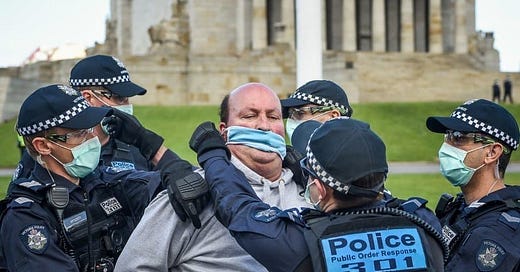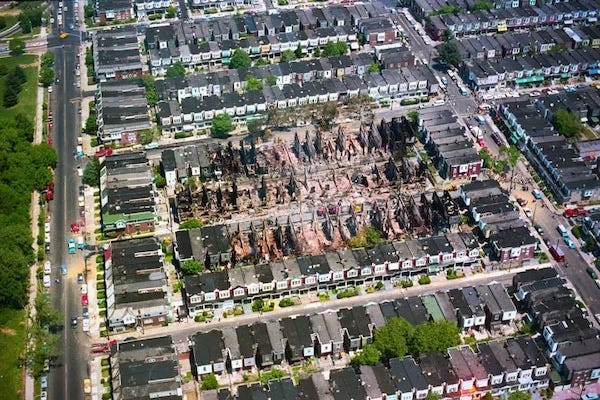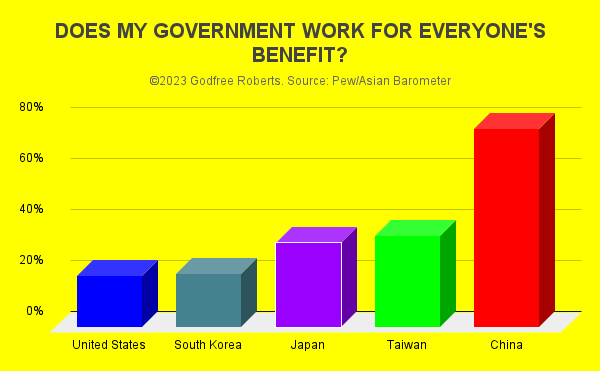An authoritarian political system demands that people obey completely and refuses to allow them freedom to act as they wish. A totalitarian political system is one in which those in power have complete control and do not allow people freedom to oppose them. Cambridge English Dictionary.
Laid-back Australians who resisted Covid policies were gagged, bound and jailed. Most Western governments adopted similar measures and, to this day, information about mRNA vaccines remains classified and no government will release them. And if Australia’s government can be authoritarian, even totalitarian, what about America’s? Or China’s?
Biden
We elect a king for four years and give him absolute power within certain limits which, after all, he can interpret for himself. Secretary of State William Henry Seward.
Over time, Congress has given every president the power to suspend or revoke all our cherished freedoms if he – and as he alone – sees fit. A sampling of powers recent American presidents have exercised:
Hire and fire the country's 5,000-50,000 top officials.
Declare war. Frequently.
Issue 300,000 National Security Letters1
Control all media at any time under his National Security and Emergency Preparedness Communications Functions.
Torture, kidnap and kill anyone, anywhere, at will.
Secretly ban 50,000 citizens from flying and refuse to explain why.
Imprison 2,000,000 poor citizens without trial.
Execute 1,000 poor citizens each year prior to arrest.
Kill 1,000 foreign civilians every day
Massacre its own men, women and children for their beliefs2
Assassinate its own citizens abroad, for their beliefs3.
Repeatedly bomb and kill minority citizens from the air. Philadelphia, 1985:
While routinely exercising powers Louis XIV would have envied, virtually every American political leader has accused China’s government of authoritarianism and called its leaders dictators. Are they right?
Biden’s favorite dictator
We know that Xi chairs China’s top civilian and military committees, but what actual power can he exercise at his own discretion? Can he
Hire and fire the country's 5,000 top officials? No. Xi can neither appoint or dismiss any official or elected politician. That is handled by the people who hired him, the all-powerful Organization Department,4 whose decisions Congress must publicly ratify.
Declare war or simply take China to war? No. Even Deng, at the height of his powers, needed the unanimous vote of his Standing Committee5 colleagues for his punitive expedition into Vietnam.
Issue 300,000 National Security Letters? No. There is no sign that such an instrument exists or is needed in China.
Control all media at any time? Yes. All governments control their when necessary but China is one of the few to publish its rules and the identities of its censors, making its media the most trusted on earth.
Torture, kidnap and kill anyone, anywhere, at will? Though our media have often alleged such offenses, there is no evidence that the Chinese government has done any of these things.
Secretly ban 50,000 citizens from flying and refuse to explain why? No. Chinese courts can ban convicted scofflaws from flying or using HSR for 12-36 months.
Imprison 2,000,000 poor citizens without trial? No. Everyone, including guilty pleaders, must receive a public court trial. Trials involving serious security breaches are held in camera, as they are everywhere.
Execute 1,000 poor citizens each year prior to arrest? No. Chinese cops shoot an average of one person each year, invariably after trying everything else.
Kill 1,000 foreign civilians every day since 1951? No. In response to requests by Singapore and Cambodia, and after six months of warnings, China killed 120,000 Vietnamese in a twenty-eight-day6 special military operation.
Massacre its own men, women and children for their beliefs? No. The PRC’s only massacre was carried out by Muslim extremists recruited, paid and trained by the USA7.
Assassinate its own citizens abroad, for their beliefs? No. Not even the most rabid media Western media have alleged that.
Repeatedly bomb and kill minority US citizens from the air? No. China’s minorities are over-represented on media, in Congress and in government.
It seems that China’s government trusts its people much more than our politicians trust us, and vice-versa:
Let people see that you only want their good and the people will be good. The relationship between superiors and inferiors is like that between the wind and the grass. The grass must bend when the wind blows across it. If good men were to govern a country continually for a hundred years they would transform the violently bad and dispense with capital punishment altogether. Analects.
Winning favor
The chart, above, reflects the priorities of capitalist governments: helping rich people exploit everyone else. Gilens and Page even uncovered the statistical evidence:
The central point of our research is that economic elites and organized business interests have substantial independent impacts on US government policy, while mass-based interest groups and average citizens have little or no independent influence'.
Clearly, mass-based interest groups and average Chinese citizens have more influence over their government than do their economic elites and organized business interests. And the vast majority of people, even most capitalists, are happy with this balance. Repeated surveys suggest that China’s government relies on setting a good example and dealing fairly with everyone to sustain its legitimacy8, just as Confucius directed.
The people are to be valued most, the altars of the grain and the land next, the ruler least. Hence, by winning the favor of the common people, you become Emperor. Mencius, 7B14
NSLs are administrative subpoenas with gag orders enjoining recipients from ever divulging that they’ve been served.
Waco
Anwar al Awlaki. Separately, his young son. Separately, his 8 yo daughter.
China’s Government HR Department, it controls 70 million Party personnel assignments and compiles detailed, confidential reports on all potential leaders. Founded by Mao and known for total discretion, it has never interacted with the public or media.
Which fired him at least once.
After they invaded Cambodia and threatened to take over Indo-China.
US Amb. Chas. H. Freeman, State Dept. Director for Chinese Affairs: "The CIA programs in Tibet, which were very effective in destabilizing it, did not succeed in Xinjiang. There were similar efforts made with the Uyghurs during the Cold War that never really got off the ground. In both cases you had religion waved as a banner in support of a desire for independence or autonomy which is, of course, is anathema to any state”.
‘In a multivariate regression analysis when other factors such as age, education, gender, income, religiosity, and geographic location are taken into consideration, government responsiveness played the single most significant role in promoting regime support in China’.






